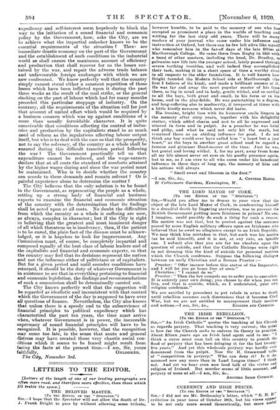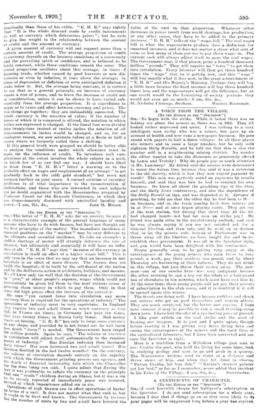CURRENCY AND HIGH PRICES.
[To THE EDITOR or TEE " SPECTATOR."1 Sza,—I did not see Mr. Bothamley's letter, which "N. H. criticizes in your issue of October 30th, but his views aPPear to be not only more sound theoretically, but more useful
practically than those of his critic. E. H. B." says rightly that "It is the whole demand made by credit instruments as well as currency which determines prices"; but he fails Iii give duo weight to the relationship between the amount of credit and the amount of currency.
A given amount of currency will not support more than a certain amount of credit. The average proportion of credit to currency depends on the business conditions of a community sad the prevailing spirit of confidence, and is believed to be fairly constant, while these conditions remain the same. The actual proportion oscillates about this average; in times if booming trade, whether caused by good harvests or new dis- eoveries or even by inflation, it rises above the average; in times of depression or deflation or even anticipated deflation it sinks below it. But, the average being constant, it is correct to say that as a general principle, an increase of currency means a rise of prices, and to leave the increase of credit out of consideration, unless it can be shown to have varied sub- Aantially from the average proportion. It is superfluous to argue as to cause and effect between currency and prices. The two things go together; they are indissolubly connected. The whole currency is the measure of value; if the number of pieces of which it is composed is altered, the notation in which values are expressed is changed. If the lineal foot were divided into twenty-four instead of twelve inches the notation of all measurements in inches would be changed, and so, for an analogous reason, we now estimate values at a florin or half a crown where we formerly called them a shilling.
If this general truth were grasped we should be better able Is analyse the conditions under which allowance must he made for the influence of credit. To introduce such com- plications at the outset involves the whole subject in a mist, in which few of us can find our way. I should have liked to draw from "Si. II. B.'s " letter a warning as to the probable effect on wages and employment of an attempt to get gradually back to the (old) gold standard," but must not trespass further on your space. A correct solution of currency problems is of vital importance to the reconstruction of civilisations, and those who are interested in such subjects are no doubt acquainted with the Memorandum prepared by Professor Cassel for the Brussels Conference, in which they are dispassionately discussed with unrivalled lucidity and







































 Previous page
Previous page